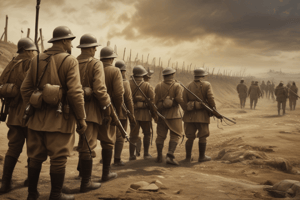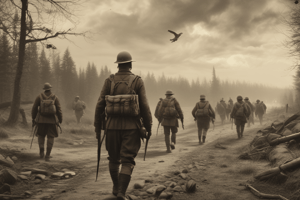Podcast
Questions and Answers
Which country's military determination failed to achieve victory in their spring 1918 offensive?
Which country's military determination failed to achieve victory in their spring 1918 offensive?
- United States
- Ottoman Empire
- France
- Germany (correct)
Which empire continued to fight even after the end of World War I?
Which empire continued to fight even after the end of World War I?
- Russian Empire
- Ottoman Empire
- Habsburg Empire (correct)
- British Empire
Who issued the Fourteen Points, a set of principles for peace, as the war's end seemed plausible to many in the civilian leadership?
Who issued the Fourteen Points, a set of principles for peace, as the war's end seemed plausible to many in the civilian leadership?
- Tsar Nicholas II of Russia
- Kaiser William of Germany
- President Wilson (correct)
- Georges Clemenceau of France
What was the immediate consequence of Austria-Hungary issuing an ultimatum to Serbia?
What was the immediate consequence of Austria-Hungary issuing an ultimatum to Serbia?
What halted the German advance in the West during World War I?
What halted the German advance in the West during World War I?
What added to the horror and destruction of World War I?
What added to the horror and destruction of World War I?
What event led to the US entry into World War I in 1917?
What event led to the US entry into World War I in 1917?
In 1915, a group of women presented a peace plan to heads of state, which later became the basis for which set of principles for peace?
In 1915, a group of women presented a peace plan to heads of state, which later became the basis for which set of principles for peace?
What event led to the negotiation of an armistice in November 1918?
What event led to the negotiation of an armistice in November 1918?
What was the outcome of the Germans' spring 1918 offensive?
What was the outcome of the Germans' spring 1918 offensive?
Which country's army disintegrated, resulting in two million casualties during offensives?
Which country's army disintegrated, resulting in two million casualties during offensives?
Who continued to fight even after the end of World War I?
Who continued to fight even after the end of World War I?
What is the estimated number of wartime deaths, including civilians, during World War I?
What is the estimated number of wartime deaths, including civilians, during World War I?
Flashcards are hidden until you start studying
Study Notes
- Europe on the brink of war: Austria-Hungary issues ultimatum to Serbia, leading to WWI
- Central Powers (Germany and Austria-Hungary) mobilize against Serbia, expecting a quick and contained conflict
- Russia comes to Serbia's defense, drawing in France and eventually Britain
- Germany follows Schlieffen Plan, aiming to defeat France quickly and move troops to the Eastern Front
- Battle of the Marne halts German advance in the West, leading to stalemate
- Central Powers suffer losses on the Eastern Front, despite superior tactics
- Diversity in armies: many soldiers from colonies and conscripted laborers
- Soldiers learn about different ways of life, fraternize with enemies during Christmas Truce
- Use of new technologies, including poison gas and airplanes, adds to the horror and destruction
- Ethnic cleansing takes place across Europe and the Ottoman Empire
- Submarine warfare at sea leads to US entry into the war in 1917, but no immediate impact
- Innovative military tactics, such as concentrated attacks at a single point, emerge.- World War I was marked by civilian uprisings, mutinies, and starvation, particularly in Russia, France, and Vienna.
- Spanish influenza, a deadly flu variant, began to afflict troops.
- Despite the chaos, rulers rejected peacemaking and compromise.
- In 1915, a group of women presented a peace plan to heads of state, which was dismissed but later became the basis for U.S. President Wilson’s Fourteen Points.
- Political leaders Kaiser William of Germany and Georges Clemenceau of France remained committed to war, even as their subjects grew weary.
- Despite military determination, the Germans failed to achieve victory in their spring 1918 offensive.
- The Allies, aided by American forces, drove the Central Powers eastward in the summer of 1918.
- The war resulted in two million casualties for the Germans alone during their offensives, as their army disintegrated.
- President Wilson issued the Fourteen Points, a set of principles for peace, as the war's end seemed plausible to many in the civilian leadership.
- Soldiers deserted and civilians rebelled in Germany, leading to the negotiation of an armistice in November 1918.
- The end of World War I did not bring an end to all wars, as the Habsburg Empire, Russia, and the Ottoman Empire continued to fight.
- Historians estimate that wartime deaths, including civilians, reached approximately 40 million people.
- The true extent of the losses during World War I is still being uncovered by historians.
- It is often said that the death of one person is a tragedy, but the death of a million people is a statistic.
Studying That Suits You
Use AI to generate personalized quizzes and flashcards to suit your learning preferences.




